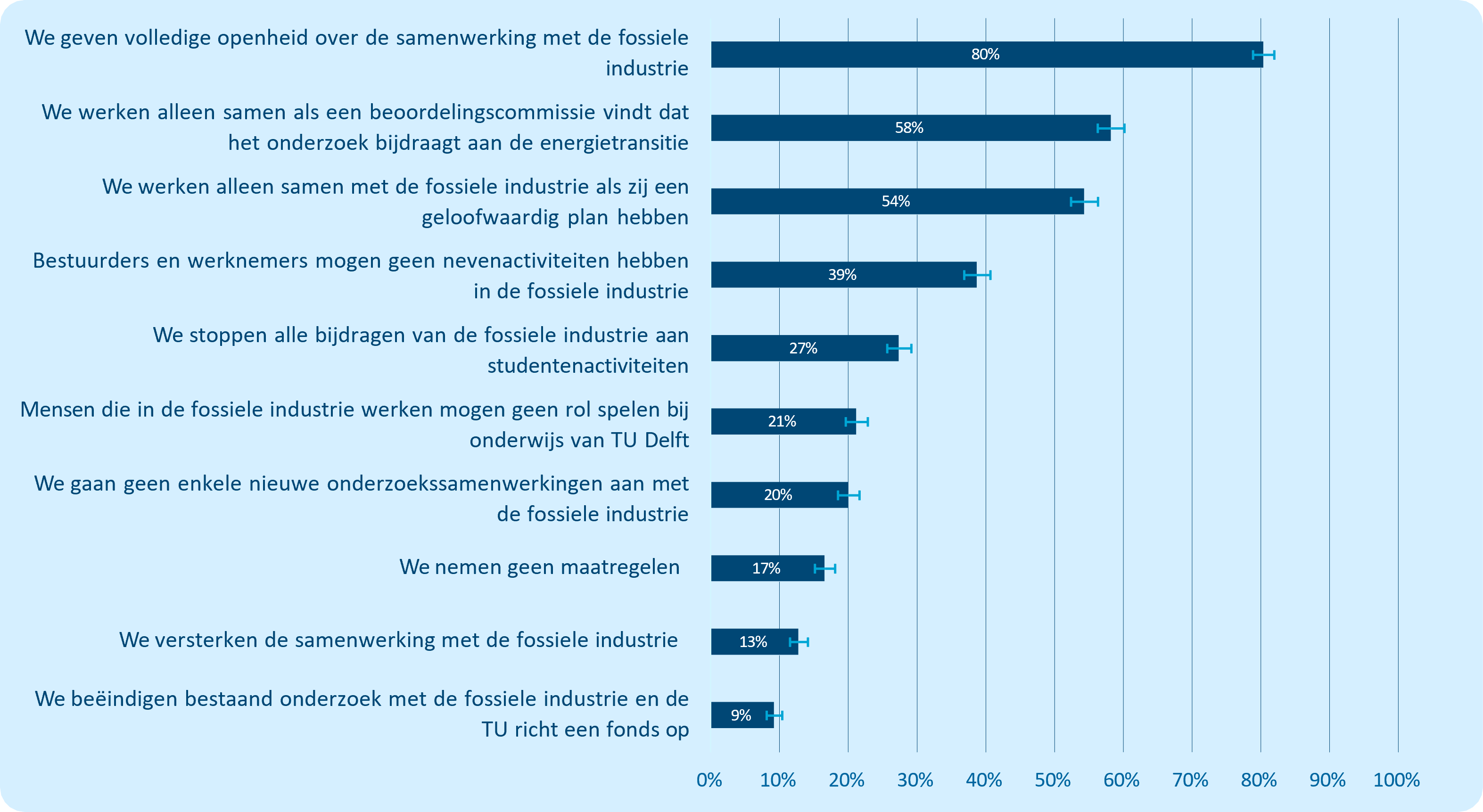Consultation on collaboration with the fossil fuel industry
Via the online consultation, it was investigated if it is desirable to continue collaborating with the fossil fuel industry. And if, so under what conditions. The main question of the consultation was: What measures should TU Delft take in collaboration with the fossil industry?
TU Delft asked Populytics to conduct a Participative Value Evaluation (PVE). The essence of a PVE is that participants take on the role of a policymaker, administrator, or politician for 15 minutes and experience the policy dilemma. Participants were presented with 10 measures that TU Delft could take regarding collaboration with the fossil industry. Participants could also advise taking no measures. For each measure, they saw what effort was required from TU Delft to implement it. Participants could then motivate their choice. Various value statements regarding collaborations with the fossil fuel industry were also presented to the participants. The report with the results and findings can be found here. Below is a summary.
High response and engagement
All students and staff were personally invited to participate in the consultation. In December 2023, 2921 staff and students at TU Delft completed the consultation. 88% of participants believe that this method should be used more often for policy decisions made by the Executive Board. These figures suggest that the topic is quite actual, and that people appreciate being involved in decisions that are likely to affect them.
Complex theme
The analysis shows that for each measure, multiple arguments for and against are provided by participants. This makes the advisory process on the desirability of measures quickly complex. The report on the outcomes of the consultation provides tools for the Executive Board to take follow-up steps with knowledge of a wide range of arguments for and against.
Large agreements on climate concerns, TU Delft’s role, and transparency advice
On three issues, the majority of the TU Delft community agrees:
- Transparency: There is broad support for providing transparency about collaboration. It is the measure most frequently advised by participants (80%), regardless of their perspective on the theme.
- Climate concerns: A large part (94%) of the participants is somewhat (31%) or very (63%) concerned about the climate. This is a much higher percentage than the Dutch average. A previous national climate consultation conducted by Populytics showed that 66% of a representative group of participants is concerned about the climate.
- Role of TU Delft: A large part (94%) of the participants agrees with the statement: "It is the task of TU Delft to contribute to the energy transition." Participants differ in how they think the energy transition can be accelerated and the role of the fossil industry therein.
Statements
Several statements were presented to the participants to reflect upon. Various statements were presented to the participants for reflection. Responses to the two main statements varied widely.
Statement 1: Collaboration with the fossil industry will accelerate the transition to a sustainable energy system.
Participants who strongly agree with this statement advise much more often to take no measures or to strengthen the collaboration compared to participants who (strongly) disagree with this statement. Participants who strongly disagree with this statement often advise restrictive measures.
Statement 2: We must set a hard limit and sever ties with companies from the fossil industry when they do not credibly act in line with the Paris goals.
The perspective of participants on this statement is another explanatory factor for the difference in advised measures. Participants who strongly agree with Statement 2 advise much more often restrictive measures than participants who disagree with Statement 2. Participants who strongly disagree with Statement 2 often advise to take no measures and strengthen the collaboration.
Conditions for Collaboration
76% of participants advise at least one of the two measures that set conditions for collaboration:
- "We only initiate research in collaboration with the fossil fuel industry if an assessment committee determines that the research is aimed at developing knowledge to accelerate the energy transition, phase out fossil fuels as quickly as possible, and/or avoid further CO2 emissions."
- "We only collaborate with companies from the fossil industry if they have a credible plan to meet the Climate Goals of the Paris Agreement."
The main arguments for setting project conditions are that in that way, only research that accelerates the energy transition is conducted and that it encourages more critical examination of the collaboration. A concern motivated by participants who do not advise this measure is that evaluating each project would be too much work.
| Evaluation Committee (project conditions) | Credible Plain (company conditions) | |
| Percentage advising only this measure | 22% | 18% |
| Percentage advising only this measure | 37% | 37% |
| Total percentage advising this measure | 58% | 54% |


